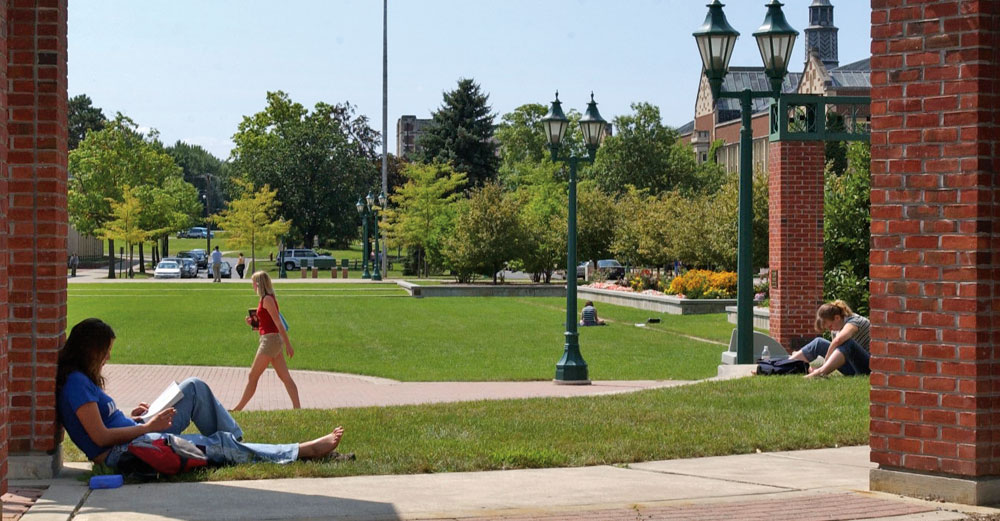
Each year on April 22, Earth Day, the world sets out to show support for environmental concerns and clean living through a global effort of civic engagement and public works. Originally started in 1970 as a proposed day to honor a healthy, sustainable environment with rallies and gatherings from coast to coast, Earth Day today spans he entire globe and reaches more than one billion people each year.
As these efforts take place all around us today, we can take stock of our own sustainability efforts locally. For example, did you know that over 75% of waste is recyclable, but Americans only recycle about 30% of it! So imagine how those numbers can fluctuate when you are in college. In addition to recycling, there are other easy things that you can do to “stay green”, while you’re in school and help reduce your environmental footprint.
Many SUNY campus have an office of sustainability that is meant to coordinate and spearhead significant energy reduction and food measures through strategic policies and practices. We’ve also gathered some tips for how to stay green as a college student. It doesn’t matter if you live on campus or off campus – these tips and tricks apply to all living arrangements so there’s no excuse for not living a “greener” lifestyle.
On Campus
1. Take shorter showers: A typical shower head uses 2.5 gallons of water a minute! You can significantly decrease the amount of water you use during your shower by shortening it to five minutes or less. This saves water and the energy needed to heat up the water. If you are up to it, you can even try a Navy Shower, where you turn off the water during the time you lather up, and then rinse off quickly.
2. Buy/Rent used books: Not only will you save a lot of money, but you’ll essentially be helping to “recycle” old books. You can try websites like Amazon, Chegg, or Textbooks.com. Or go completely paperless and purchase the digital version of your textbooks to view on your laptop or tablet.
3. Use energy efficient light bulbs: By switching from traditional incandescent light bulbs to energy efficient light bulbs like compact florescent lamps (CFLs) or light emitting diodes (LEDs) you can use a lot less energy. These environmentally friendly bulbs use 25%-80% energy and also last longer too. Even though they tend to be a little more expensive at initial purchase, you’re essentially saving more money as you do not have to replace them as often.
4. Utilize reusable water bottles: Americans throw away about 28 billion bottles and jars every year! Why not recycle it instead? Buying glass or hard plastic bottles that you can refill again and again, cut down on the amount of plastic bottles that are constantly being thrown away. However if you still want to use a regular plastic water bottle, make sure to drop it in a recycling bin when you’re finished drinking it!
5. Join a sustainability club: Once you start the journey to being good to the environment it’s hard to stop! By joining or creating a sustainability club on campus you can encourage other students to work towards being more “green”, while doing fun events such as campus cleanups or hosting Farmer’s Markets to bring fresh produce to campus.
Off Campus
6. Turn off your electronics: As a college student, there are days where staying up late to study may be required or even watching a movie on your computer before going to bed sounds like a relaxing way to end your long day. By turning off your computers instead of leaving it on sleep mode, you can save 40 watts- hours per day. Make sure to keep this in mind instead of leaving your computer or other electronics connected over night.
7. Don’t preheat the oven: Living downtown may require students to cook their own meals and utilize the oven to make their favorite pallets. A great way to save energy is by not pre-heating the oven unless you are baking pastries. Your oven will cook lunch or dinner foods as it heats up. Additionally, in helping the atmosphere, the best way to check on the progression of your food is by looking through the oven window instead of opening the oven door.
8. Recycle newspapers: There are days when you may not have time to pick up and read the news paper, instead of leaving it on your porch, make sure to gather them up and recycle them. There are 63 million news paper printed each day in the United States and about 69% of them will be thrown away.
9. Ditch the plastic grocery bags: Each year the U.S uses nearly 100 billion plastic bags. Living off-campus may require going food shopping on a weekly basis, so it becomes extremely helpful to the planet if you prevent plastic bags from making their way to the environment and ocean. Switch to reusable cloth bags that can be reused over and over again. They are more durable and can typically carry more goods per bag.
10. Cut down junk mail: Unlike living on campus, when living downtown you be begin to receive a large of amount of junk mail. The average American receives 41 pounds of junk mail a year, destroying about 100 million trees. Try your best to unsubscribe to newspapers or magazine mails that you are not interested in reading and recycle your junk mail in an effort to help our environment!




Great post on going green! I do almost everything in your post. I now have other things to add to my list. I live in an apartment complex that does no recycle, which is frustrating. That however doesn’t stop me from doing things like we cycling plastic, using green lighting,and recycling metals, and making full use of second hand stores and places like craigslist’s to locate quality gently use items. If each one does their own part collectively we can make a big difference.
Great job, Atiba! I would add 1 more: Leave the car at home – take a bus, bike or find a buddy to carpool with!